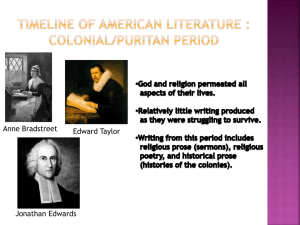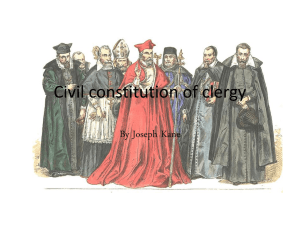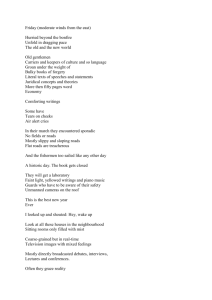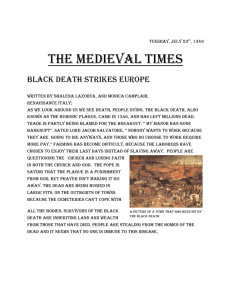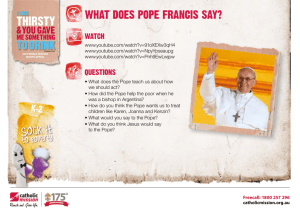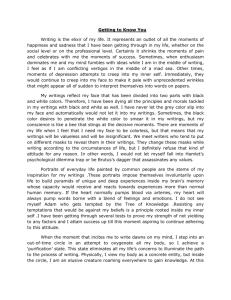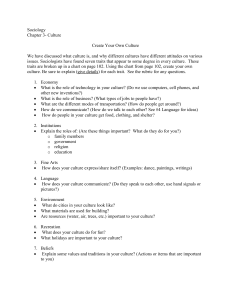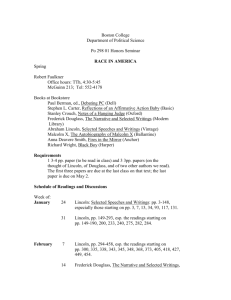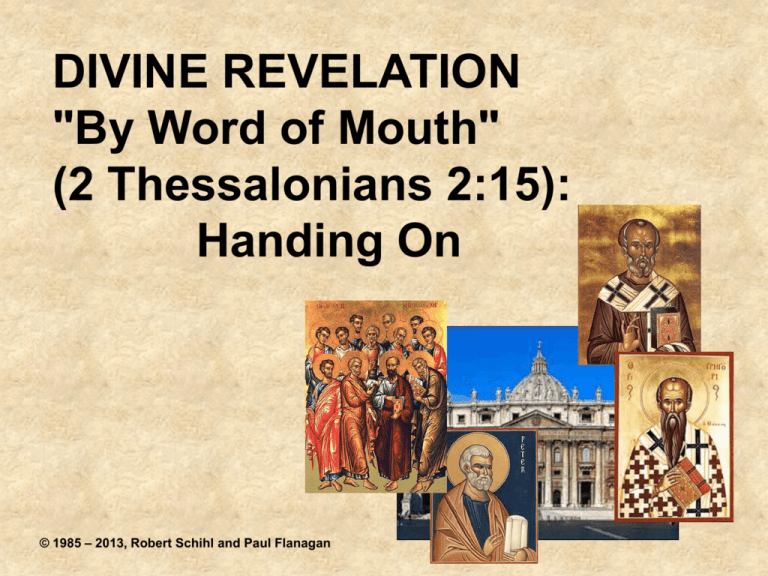
DIVINE REVELATION
"By Word of Mouth"
(2 Thessalonians 2:15):
Handing On
© 1985 – 2013, Robert Schihl and Paul Flanagan
Paradosis: Handing On Divine Revelation
Catholic Christians believe that in Jesus Christ the Lord
is summed up the entire Revelation of the most high God.
On Divine Revelation, 7, Vatican Council II
"Therefore [it is] Christ the Lord, in whom the entire
Revelation of the most high God is summed up... "
2 Corinthians 1:20
For however many are the
promises of God, their Yes
is in him (Jesus Christ).
2 Corinthians 4:5-6
For we do not preach ourselves but Jesus Christ as
Lord, and ourselves as your slaves for the sake of
Jesus. For God who said, "Let light shine out of
darkness," has shone in our hearts to bring to light
the knowledge of the glory of God on the face of
(Jesus) Christ.
The Revelation of Yahweh to His chosen People was given
to the Israelites and transmitted from generation to generation
for centuries.
Peter defined the process of handing down the Revelation
of Yahweh from father to son. The Greek word for this process
of handing on the Word of God is paradosis .
1 Peter 1:18-19
... realizing that you were ransomed from your futile
conduct, handed on (patroparadotos) by your
ancestors, not with perishable things like silver or gold
but with the precious blood of Christ as of a spotless
and unblemished lamb
The New Testament authors referred frequently to the process
of "handing on" the Word of God to His People.
Luke 1:1-2
Since many have undertaken to compile a narrative
of the events that have been fulfilled among us, just as
those who were eyewitnesses from the beginning and
ministers of the word have handed them down
(paredosan) to us.
1 Corinthians 11:23
For I received from the Lord what I also handed on
(paredoka) to you, that the Lord Jesus, on the night
he was handed over, took bread ...
1 Corinthians 15:3-4
For I handed on (paredoka) to you as of first importance
what I also received ...
2 Timothy 2:2
And what you heard from me through many witnesses
entrust (parathou) to faithful people who will have the
ability to teach others as well.
It is Paul who makes the distinction of modes in which
the Revelation of God to His People can be handed on.
Paul also called the process of handing on the Word of
God "tradition." He then terms two ways in which "traditions"
are transmitted, by word, orally, and by letter, written.
2 Thessalonians 2:15
Therefore, brothers, stand firm and hold fast to the
traditions (paradoseis) that you were taught, either
by an oral statement or by a letter of ours.
Therefore, Catholic Christians believe that the Bible--written
tradition--is not the only source of Revelation.
And, as Catholic Christians believe, the Bible does not teach
that it is the only source of Revelation.
John 20:30
Now Jesus did many other signs in the presence of
(his) disciples that are not written in this book.
John 21:25
There are also many other things that Jesus did, but
if these were to be described individually, I do not think
the whole world would contain the books that would
be written.
The official teaching of the Catholic Church reflects Biblical
teaching on the whole of Revelation.
On Divine Revelation, 9, 10, Vatican Council II
"Sacred Tradition and Sacred Scripture,
then, are bound closely together, and
communicate one with the other ...
Sacred Tradition and Sacred Scripture
make up a single sacred deposit of
the Word of God, which is entrusted to
the Church."
Catholic Christians believe that the Bible affirms that
God's way of revealing himself to His People is to choose
certain people for these tasks:
in the Hebrew Scriptures these people were
the patriarchs, prophets, judges, and kings;
in the New Testament, these people are
apostles, prophets, teachers, and faithful people.
Paul defines the New Testament people chosen to hand
on the Revelation of the Word of God.
2 Timothy 2:2
And what you heard from me through many witnesses
entrust to faithful people who will have the ability to
teach others as well.
Paul also continues to describe who the "faithful people" are
who are to hand on the Revelation of God.
The first category of "faithful people" is episcopos, bishop.
1 Timothy 3:1-2
This saying is trustworthy: whoever aspires to the office
of bishop (episcopes) desires a noble task. Therefore,
a bishop (episcopon) must be irreproachable, married
only once, temperate, self-controlled, decent, hospitable,
able to teach.
Titus 1:7-9
For a bishop (episcopon) as God's steward must be
blameless, ... holding fast to the true message as taught
so that he will be able both to exhort with sound doctrine
and to refute opponents.
The second category of "faithful people" is presbyteros,
a presbyter, priest, elder.
Titus 1:5-6
Appoint presbyters (presbyterois) in every town, as
I directed you, on condition that a man be blameless,
married only once, with believing children who are
not accused of licentiousness or rebellious.
1 Timothy 5:17
Presbyters who preside well deserve double honor,
especially those who toil in preaching and teaching.
The third category of "faithful people" is diakonos, deacon.
1 Timothy 4:6,13,16
If you will give these instructions to the brothers, you
will be a good minister (diakonos) of Christ Jesus,
nourished on the words of the faith and of the sound
teaching you have followed. ... Until I arrive, attend to
the reading, exhortation, and teaching. ... Attend to
yourself and to your teaching; persevere in both tasks,
for by doing so you will save both yourself and those
who listen to you.
1 Timothy 3:8-9
Similarly, deacons (diakonous) must be dignified,
not deceitful, not addicted to drink, not greedy for
sordid gain, holding fast to the mystery of the faith
with a clear conscience.
The Bible testifies that the Apostolic Church exercised this
teaching authority ("holding fast to the true message ... to
refute opponents" [Titus 1:9]) beyond the words and deeds of
Jesus Christ.
For example, the Acts of the Apostles records that there were
different truths being taught regarding keeping the Mosaic Law.
One group represented by Judaizers taught that Gentile
Christians must come to the Christian life through keeping the
Mosaic Law; the second group represented by Paul taught that
Gentile Christians did not need to keep the Mosaic Law.
There was also no Scripture regarding the truth of the issue.
So they appealed to the authority of the Holy Spirit in council.
The Catholic Church has followed this model ever since.
The Biblical Model for Handing On Truth and
Refuting Error: Acts 15, The Council of Jerusalem
Error in teaching:
Acts 15:1
Some who had come down from Judea were instructing
the brothers, "Unless you are circumcised according to
the Mosaic practice, you cannot be saved."
Dissension and controversy:
Acts 15:2
Because there arose no little dissension and debate
by Paul and Barnabas with them, ...
Appeal to the apostles and presbyters in Jerusalem:
Acts 15:2
... it was decided that Paul, Barnabas, and some
of the others should go up to Jerusalem to the
apostles and presbyters about this question.
Apostles and presbyters convened:
Acts 15:6
The apostles and the presbyters met together to see
about this matter.
Discussion:
Acts 15:7-11
After much debate had taken place, Peter got up and
said to them, "My brothers, you are well aware that from
early days God made his choice among you that through
my mouth the Gentiles would hear the word of the gospel
and believe. And God, who knows the heart, bore
witness by granting them the holy Spirit just as he did us.
He made no distinction between us and them, for by faith
he purified their hearts. Why, then, are you now putting
God to the test by placing on the shoulders of the disciples
a yoke that neither our ancestors nor we have been able
to bear? On the contrary, we believe that we are saved
through the grace of the Lord Jesus, in the same way
as they."
Barnabas and Paul
Acts 15:12
The whole assembly fell silent, and they listened while
Paul and Barnabas described the signs and wonders
God had worked among the Gentiles through them.
James
Acts 15:13-21
After they had fallen silent, James responded, "My
brothers, listen to me. Symeon has described how God
first concerned himself with acquiring from among the
Gentiles a people for his name. The words of the
prophets agree with this, as is written: 'After this I shall
return and rebuild the fallen hut of David; from its ruins
I shall rebuild it and raise it up again, so that the rest of
humanity may seek out the Lord, even all the Gentiles
on whom my name is invoked. Thus says the Lord
who accomplishes these things, known from of old.'
James – Acts 15:13-21 (Continued)
It is my judgment, therefore, that we ought to stop
troubling the Gentiles who turn to God, but tell them
by letter to avoid pollution from idols, unlawful marriage,
the meat of strangled animals, and blood. For Moses,
for generations now, has had those who proclaim him
in every town, as he has been read in the synagogues
every sabbath."
Problem is resolved:
Acts 15:22
Then the apostles and presbyters, in agreement with
the whole church, decided ...
Decree is promulgated:
Acts 15:22-23
The ones chosen were Judas, who was called
Barsabbas, and Silas, leaders among the brothers.
This is the letter delivered by them: "The apostles and
the presbyters, your brothers, to the brothers in
Antioch, Syria, and Cilicia of Gentile origin: greetings."
The authority of the Holy Spirit is appealed:
Acts 15:28
It is the decision of the holy
Spirit and of us ...
Paradosis or tradition falls into two categories.
The difference can be seen in Acts 15. Besides the issue
of following the Mosaic Law for gentile converts, which
meant primarily circumcision, the Council of Jerusalem
also decreed that converts had "to avoid pollution from idols,
unlawful marriage, the meat of strangled animals, and blood"
(Acts 15:20).
There are clearly distinguished paradosis or traditions which
are considered irrevocable, unchangeable, even to our day,
e.g. circumcision is not a requirement for new Christians. On
the other hand, today we would not be concerned with "pollution
from idols," how an animal is killed for meat, or whether blood
is in our food. These appear to be different traditions from the
former--changeable and not binding in the same way as
non-circumcision.
The Catholic Church also follows this biblical model in her
approach to paradosis/traditions.
Hence, there are paradosis/traditions which are unchangeable,
capital letter "T", "Traditions." These are the defined faith or
moral teachings based on the Bible but revealed by the Holy
Spirit as an authority in the Church (Acts 15:28). An example
from the history of the Catholic Church of Tradition (with a
capital letter "T") is the teaching on purgatory. This teaching of
the Church can never change.
There appear to be paradosis/traditions which are changeable,
small letter "t", "traditions." These are the "rules of the
organization, rules of the club." These change as people,
culture, faith and understanding develop. An example from
the history of the Catholic Church of tradition (with a lower
case letter "t") is the teaching on the prohibition of eating
meat on Fridays. This practice of mandatory abstinence
as penance in the Church has changed.
Acts 15 Model: General or Ecumenical Councils
of the Church Universal
Following the example of the Apostolic Church in the persons
of the Apostles in the book of Acts, especially chapter 15,
the Catholic Church is motivated by a number of scriptures.
The Catholic Church takes seriously the need to know the truth
and to refute error.
John 15:26
When the Advocate comes whom I will send you from
the Father, the Spirit of truth that proceeds from the
Father, he will testify to me.
John 16:12-13
I have much more to tell you, but you cannot bear it
now. But when he comes, the Spirit of truth, he will
guide you to all truth.
Acts 1:8
But you will receive power when the holy Spirit comes
upon you, and you will be my witnesses in Jerusalem,
throughout Judea and Samaria, and to the ends of the
earth.
2 Peter 2:1
There were also false prophets among the people, just
as there will be false teachers among you, who will
introduce destructive heresies and even deny the
Master who ransomed them, bringing swift destruction
on themselves.
Titus 1: 7, 9-11
For a bishop (episcopon) as God's steward ... holding
fast to the true message as taught so that he will be
able both to exhort with sound doctrine and to refute
opponents. For there are also many rebels, idle talkers
and deceivers ... It is imperative to silence them.
Galatians 1: 6-9
I am amazed that you are so quickly forsaking the one
who called you by (the) grace (of Christ) for a different
gospel (not that there is another). But there are some
who are disturbing you and wish to pervert the gospel
of Christ. But even if we or an angel from heaven should
preach (to you) a gospel other than the one that we
preached to you, let that one be accursed! As we have
said before, and now I say again, if anyone preaches
to you a gospel other than the one that you received,
let that one be accursed!
The Catholic Church also understands the need to interpret
correctly the truth of all of the Bible. The Bible warns us that
there will be incorrect interpretation without authority. All
interpretations of a scripture cannot be equally true (it is contrary
to the nature of truth); some interpretations of the same scripture
are mutually incompatible (e.g., Mt 16:16; Jn 6). Hence there
must be an authority to whom truth and error can be appealed.
2 Peter 3:16
In them (Paul's letters) there are some things hard to
understand that the ignorant and unstable distort to
their own destruction, just as they do the other
scriptures.
The Catholic Church accepts the authority both of Divine
Revelation and of the Holy Spirit. Deviation from the truth
must be cursed and condemned.
Romans 13:1-2
Let every person be subordinate to the higher authorities,
for there is no authority except from God, and those that
exist have been established by God. Therefore, whoever
resists authority opposes what God has appointed,
and those who oppose it will bring judgment upon
themselves.
2 Thessalonians 2:8-12
And then the lawless one will be revealed, whom the
Lord (Jesus) will kill with the breath of his mouth and
render powerless by the manifestation of his coming,
the one whose coming springs from the power of Satan
in every mighty deed and in signs and wonders that lie,
and in every wicked deceit for those who are perishing
because they have not accepted the love of truth so that
they may be saved. Therefore, God is sending them a
deceiving power so that they may believe the lie, that all
who have not believed the truth but have approved
wrongdoing may be condemned.
The Catholic Church has, in all ages, understood both
the need for renewal and reformation of Christian
faith and living, and general revival in the Church as a
whole, and
the need to teach the truth when confronted with error.
The Church exercised her teaching authority (under the
guidance of the Holy Spirit) and called the faithful people
entrusted with teaching others together in universal (ecumenical)
council for renewal and reformation, and when truths were
abandoned and error (heresy) was being taught (Titus 1:9).
The truth was expressed and defined; error and false teachers
condemned (anathema sit, "let them [him, it] be anathema,
condemned, damned").
The history of the ecumenical councils attests to the fidelity
of the Catholic Church to the teaching and direction of both
the authority of Scripture and the authority of the Holy Spirit.
The following section presents in summary form the history
of the ecumenical councils of the Church throughout history
from the Council of Jerusalem to Vatican II.
General Councils of the Church
Jerusalem (Acts 15:2)
When and where
Jerusalem, Palestine, 49 AD.
Crisis or controversy
Gentile converts must follow Mosaic Law; "Unless you are
circumcised according to the Mosaic practice, you cannot be
saved." Acts 15:1
Attendees
"Apostles and presbyters" Acts 15:6, and the following notables:
Paul and Barnabas,
Peter, James (Acts 15:6-22)
Decrees and resolutions
"It is the decision of the Holy Spirit and of us not to place on
you any burden beyond these necessities." Acts 15:28
Nicea I
When and where
325 in Nicea (Now Iznik, Turkey, 70 miles from Constantinople on
the Asiatic shore of the Bosporus)
Crisis or controversy
Christ was a pure creature; made out of nothing; liable to fall;
the Son of God by adoption, not by nature: Arianism.
Attendees
318 bishops, and the following notables:
Convened: Constantine I, Emperor;
Eusebius of Caesarea, historian;
St. Athanasius, theologian;
Ratified: Silvester I, Pope.
Decrees and resolutions
The Nicene Creed;
The Consubstantiality of the Word: homousion with the Father;
Solved how the date of Easter should be calculated.
Constantinople I
When and where
381 in Constantinople (now Istanbul, Turkey)
Crisis or controversy
The need to insist on homousion;
Demonstrate to the world that Christians of the East are not Arians;
Apollinaris was teaching that Christ was not true man.
Attendees
186 bishops, and the following notables:
Convened: Theodosius I, Emperor;
St. Basil the Great;
St. Gregory of Nyssa;
St. Gregory of Naz., theologians;
Ratified: Damasus, Pope
Decrees and resolutions
Renewed the work of Nicaea;
Condemned the heresy of the Macedonians (the Holy Spirit
was not really God); Condemned the heresy of Apollinaris
(that Christ was not really a man).
Ephesus
When and where
431 in Ephesus
Crisis or controversy
Nestorius was teaching that Mary was not the mother of God;
Proponents of Nestorius began claiming that Christ was actually
two separate persons, human and divine.
Attendees
250 bishops, and the following notables:
Convened: Theodosius II, Emperor;
St. Cyril of Alexandria;
St. John Chrysostom;
Ratified: Celestinus I, Pope.
Decrees and resolutions
Condemned Nestorius;
Decreed that Mary was also Theotokos, mother of God;
Declared that Christ is true God and true man, that he has two
natures (human and divine) joined in one person.
Chalcedon
When and where
451 in Chalcedon (ancient seaport of Bithynia on the sea
of Marmara)
Crisis or controversy
Monophysites were teaching that Christ had a single divine
nature and no human nature.
Attendees
600 bishops,
Convened: Marcianus, Emperor;
Ratified: Leo I, Pope.
Decrees and resolutions
Condemned Monophysitism;
Declared that Christ had two distinct natures and was both true
God and true man;
Promulgated canons of church discipline.
Constantinople II
When and where
553 in Constantinople
Crisis or controversy
Emperor Justinian I wanted the Church to consider the orthodoxy
of three Greek theologians: Theodore of Mopsuestia, Theodoret
of Cyrrhus, and Ebas of Edessa.
Attendees
150 bishops,
Convened: Justinian I, Emperor;
Decrees and resolutions
Condemned the writings of theologians as having been infested
with Nestorianism.
Constantinople III
When and where
680 in Constantinople
Crisis or controversy
Monothelism was teaching that Christ did not possess a
human will.
Attendees
174 bishops,
Convened: Constantine IV, Emperor;
Ratified: Leo II, Pope.
Decrees and resolutions
Condemned Monothelism;
Declared that Christ has two wills, human and divine.
Nicaea II
When and where
787 in Nicea
Crisis or controversy
Iconoclasts taught that using sacred images was idolatry.
Attendees
390 bishops,
Convened: Irene, Empress;
Ratified: Adrian I, Pope.
Decrees and resolutions
Condemned Iconoclasts;
Declared that sacred images may be honored without idolatry.
Promulgated canons of church discipline.
Constantinople IV
When and where
870 in Constantinople
Crisis or controversy
Needed to decide the right of Patriarch Photius or the restoration
of Ignatius.
Attendees
102 bishops,
Convened: Basil, Emperor;
Ratified: Adrian II, Pope.
Decrees and resolutions
Photius was condemned in 27 canons.
Lateran I
When and where
1123 (Lateran Basilica in Rome, Italy)
Crisis or controversy
Needed to face the social and religious problems of the day;
First ecumenical council in the West.
Attendees
300 bishops, and the following notables:
Convened: Callistus II, Pope;
Ratified: Callistus
Decrees and resolutions
Promulgated canons of mixed
matters.
Lateran II
When and where
1139 at the Lateran Basilica
Crisis or controversy
A double papal election and ensuing schism when two rivals
claiming to be pope divided the church.
Attendees
1000 bishops,
Convened: Innocent II, Pope;
St. Bernard of Clairvaux
Ratified: Innocent II.
Decrees and resolutions
Took measures against schism of
antipope Anacletis II;
Promulgated canons of church
discipline
Lateran III
When and where
1179 in the Lateran Basilica
Crisis or controversy
Reorganization had to be faced; there was the ever-needed
pressure to reform; restraint of abuses.
Attendees
More than 300 bishops,
Convened: Alexander III, Pope;
Ratified: Alexander III, Pope.
Decrees and resolutions
Decreed that papal elections required
two-thirds majority of cardinals at
the conclave;
Promulgated numerous disciplinary
canons.
Lateran IV
When and where
1215 in the Lateran Basilica
Crisis or controversy
Albigensian heresy: two supreme beings, Evil and Good;
Christ did not die; all material things must.
Attendees
412 bishops; 388 priests, and the following notables:
Convened: Innocent III, Pope;
Ratified: Innocent III, Pope.
Decrees and resolutions
Declaration of Canon Law: the law
of the Church;
Decrees against Albegensians
and Waldensians.
Lyons I
When and where
1245 in Lyon (city in E. France)
Crisis or controversy
The difficult and heretical behavior of Emperor
Frederick II;
The persecution of religion.
Attendees
140 bishops; more than 300 in toto,
Convened: Innocent IV, Pope;
Ratified: Innocent IV, Pope.
Decrees and resolutions
Excommunication and deposition
of Frederick II.
Lyons II
When and where
1274 in Lyons, France
Crisis or controversy
A marked decline of the detachment of the popes from the
things of the world;
Chronic restiveness of the Greeks toward Roman primacy.
Attendees
500 bishops; 570 priests, and the following notables:
Convened: Gregory X, Pope;
St. Thomas Aquinas,
St. Bonaventure;
Ratified: Gregory X, Pope.
Decrees and resolutions
General reformation of the morals of clergy
and bishops;
Dogmatic constitution of filioque;
Profession of faith of Greek Emperor Michael VIII.
Vienne
When and where
1312 in Vienne (city in E. France near Lyons)
Crisis or controversy
Problems with the religious order of Knights Templars.
Attendees
122 bishops; 300 abbots,
Convened: Clemens V, Pope;
Ratified: Clemens V, Pope.
Decrees and resolutions
Templars were suppressed;
Canon Law enacted;
Three definition of dogmas;
Disciplinary decrees written.
Constance
When and where
1414 – 1418 in Constance (city in
Germany on Swiss border)
Crisis or controversy
The Great Western Schism: two sets of popes.
Attendees
32 Cardinals; 183 bishops; 100 abbots;
350 priests
Convened: Segismund, Emperor;
Ratified: Martin V, Pope.
Decrees and resolutions
Reformation of the Church;
Material organization of religion.
Florence
When and where
1438 in Florence (city of northern Italy)
Crisis or controversy
East/West reunion;
Constantinople was being threatened by Mohammedans.
Attendees
More than 150 bishops,
Convened: Eugene IV, Pope;
Ratified: Eugene IV, Pope.
Decrees and resolutions
Reunion of oriental churches.
Lateran V
When and where
1512 – 1517 in the Lateran Basilica
Crisis or controversy
Needed reform in church administration;
Rise of atheistic philosophy;
Friction between bishops and orders
of friars.
Attendees
115 bishops,
Convened: Julius II, Pope;
Cajetan;
Ratified: Leo X, Pope.
Decrees and resolutions
Condemned the Averroes philosophy: the soul of man is
not immortal;
Promulgated reform decrees;
Established principles of book censorship;
Rights of bishops defined.
Trent
When and where
1545 – 1563 in Trent (in Hapsburg's Germany; now N. Italy)
Crisis or controversy
Martin Luther;
Revolt against the Pope;
Widespread heresy.
Attendees
70 - 252 bishops,
Convened: Paul III, Pope;
Ratified: Pius IV, Pope.
Decrees and resolutions
Doctrinal decrees: restatement of belief in opposition to the
new theologies;
The Catholic Reformation: the reformation of Catholic life.
Vatican I
When and where
1870 in St. Peter's Basilica, Vatican City
Crisis or controversy
A return to life of the Catholic Church: needed a revival of
religious life
General restoration and restatement of the faith was needed;
Christian marriages and education needed safeguarding.
Attendees
747 bishops,
Convened: Pius IX, Pope;
Ratified: Pius IX, Pope.
Decrees and resolutions
Promulgated decrees on the Catholic
Faith and on the Church;
Condemned the Rationalists and
Semirationalists;
Defined the charism of infallibility.
Vatican II
When and where
1962 – 1965 in St. Peter's Basilica
Crisis or controversy
Constant need for reform and revival;
Needed translation of faith into modern era:
communication media;
Christians and Jews; religious freedom, etc.
Attendees
2908 bishops
Convened: John XXIII, Pope;
Ratified: Paul VI, Pope.
Decrees and resolutions
Issued 16 documents:
On Divine Revelation;
The Pastoral Constitution;
On The Church in the Modern World;
On The Church, etc.
Apostolic Fathers of the Church
Catholic Christians believe that the promise of the Spirit of
Truth to guide believers in truth is found in the constant faith
of the Church preserved in the writings of the Apostolic Fathers.
The term "Apostolic Fathers" applies to certain disciples and
successors of the twelve apostles. In a more restricted sense,
the term is applied to a group of
Greek-language writers who
were among the martyrs and major
figures of the 1st and 2nd centuries
in the Christian Church.
Clement I, St. (Clement of Rome)
Personal
4th Bishop of Rome
Place and dates
r. 92 - 101
Writings
I Clement or Letter to the Corinthians (c. 96):
earliest piece of literature outside the NT
historically attested;
addressed disputes in the Church at Corinth;
II Clement (a sermon)(c. 140): Clementine
authorship disputed
Ignatius of Antioch, St.
Personal
Martyr for the faith
Disciple of John the Evangelist
Condemned to die by wild beasts in Rome
Brought from Antioch to Rome and wrote seven
letters to churches and individuals along the way
Place and dates
d. 110
Writings
Letter to Ephesians; Letter to Magnesians;
Letter to Tralles; Letter to Philadelphians;
Letter to Smyrnans; Letter to Romans;
Letter to Polycarp of Smryna
These contain warnings against heretical doctrines; contain detailed
summaries of doctrines; and a picture of Church organization
with bishops, presbyters (elders) and deacons;
First to stress Virgin Birth and to use the term "catholic church"
Polycarp of Smyrna, St.
Personal
Received a visit and letter from Ignatius
Represented the Church of Asia Minor in meetings with Pope Anicetus
Dating of Easter
A teacher of Irenaeus
Knew John the Evangelist and other apostles
Was a disciple of John the Evangelist
Place and dates
69-155
Writings
Polycarp to the Philippians
Martyrdom of Polycarp (about him)
Unknown Author of the Didache
Personal
Unknown
Place and dates
(Syria) 70-110?
Writings
Didache ("Teaching"):
A compendium of moral precepts,
instructions on organization
of church communities, liturgical
worship and regulation.
It contains oldest Eucharistic prayer,
directions on Baptism, fasting, prayer,
treatment of bishops, deacons,
prophets .
Barnabas
Personal
Surname of Joseph, a member of the early Christian
Church in Jerusalem (Acts 4:36)
Companion of Paul
Did missionary work with Mark (Acts 15:39)
Place and dates
c. 130
Writings
Letter of Barnabas
Allegorical interpretation of the
Old Testament
Papias of Hierapolis
Personal
Contemporary of Polycarp
Knew of a collection of the "sayings of the Lord" to have been
written in Aramaic or Hebrew by Matthew
Place and dates
(Phrygia) 120?
Writings
Five Books of Exegeses of the Dominical Oracles:
Quoted by Irenaeus
Witness to the existence of Jewish Christianity
Hermas
Personal
Little known
Place and dates
(Rome) 140?
Writings
Mandates
Similitudes
The Shepherd: a vivid description of
early Christianity
Post-Apostolic Fathers of the Church
Paradosis or handing on or down of Divine Revelation is
affirmed in Sacred Scripture. Hence, it must be found in some
contiguous historical form from age to age. Catholic Christians
believe that the promise of the Spirit of Truth to guide believers
in truth is found in the constant faith of the Church as preserved
in the writings of the Post-Apostolic Fathers.
The term "Post-Apostolic Fathers" is the name given by the
Christian Church to the writers who established Christian
doctrine before the 8th century. The writings of the Fathers
or Patristic Literature synthesized Christian doctrine as found
in the Bible, especially the gospels, the writings of the Apostolic
Fathers, ecclesiastical dictums, and decisions of the Church
councils.
Justin (Martyr), St.
Personal
Philosopher, theologian, early apologist, martyr
Convert to Christianity
Place and dates
(Rome) 100-165
Writings
Apologies for the Christians: erudite defense
of Christians against charges of atheism
and sedition;
Dialogue with Trypho the Jew: a record of
an actual discussion at Ephesus;
valuable information about 2nd century
Christian Church .
Irenaeus, St.
Personal
Heard the preaching of Polycarp the disciple of John the
Evangelist
Appointed the bishop of Lyon (177)
Place and dates
(Asia Minor) 140?-202?
Writings
Against the Heresies: written against the
Gnostics; contributed to the knowledge
of Gnosticism
Clement of Alexandria
Personal
Greek theologian
Converted from paganism
Ordained a presbyter
A teacher of Origen
Place and dates
(Athens) 150?-215?
Writings
Hortatory Address to the Greeks: a defense
of the faith
The Tutor: instruction in manners and morals
The Miscellanies: a discussion of various points
of doctrinal theology designed to guide
the mature Christian to perfect knowledge .
Tertullian
Personal
Converted to Christianity between 190 and 195
Became a presbyter of the Church (197)
Zealous champion of Christianity
Profoundly influences later Church fathers
Embraced and became a leader of
the Montanists (207?) a sect later declared
heretical
Place and dates
(Rome) 160?-220?
Writings
Apologeticus (c. 197): his most famous work; a defense of
Christians against pagan charges
On the Claims of Heretics: argues that the Church alone has
the authority to declare what is and is not orthodox Christianity
On Baptism
On Prayer: throws light on contemporary religious practices
Origen
Personal
A student of Clement
Ordained a presbyter
The most accomplished biblical scholar
of the early Church
Father of the allegorical method of
scripture interpretation
He developed the idea of Christ as
Logos or Incarnate Word
Place and dates
(Alexandria) 185?-254?
Writings
Against Celsus: closely reasoned apologetic work refuting the
arguments advanced by the Celsus, the first serious critic of
Christianity
Cyprian, St.
Personal
Convert to Christianity c. 245
Bishop of Carthage, 248
One of the most authoritative Fathers
of the Church
Involved in controversy over treatment
of those who had left the Church, and
those who were baptized by heretics:
Accepted the teaching of Rome.
Place and dates
(Carthage) 200-258
Writings
On Unity of the Catholic Church: exposition of the hierarchical
organization of the Church
Athanasius, St.
Personal
Played a prominent role in the theological struggle in the
Council of Nicea (325)
Opposed Arius (256-336) who maintained that the Son was of
a different substance from that of the Father, and was merely
a creature
Formulated the "homousian doctrine" that the Son of God is the
same essence of substance of the Father
Became bishop of Alexandria (328)
Place and dates
(Alexandria) 293-373
Writings
Discourses Against the Arians
History of the Arians
Apology Against the Arians
On the Decrees of the Nicene Synod
Cyril of Jerusalem
Personal
Bishop of Jerusalem in 351
Embroiled in controversy over episcopal duties
Place and dates
(Jerusalem) 315?-387?
Writings
23 Treatises: addressed to catechumens and
newly baptized; some treatises are doctrinal
and present the creed of the Church;
some are concerned with ritual and present
a detailed account of Baptism, Eucharist
and chrism
Basil, St.
Personal
Brother of Gregory of Nyssa and a friend of Gregory of Nazianzus
Patriarch of Eastern monasticism
Wrote a rule of the monastic way of life
Founded the Basilian monks (360)
Bishop of Caesarea (370).
Place and dates
(Caesarea Mazaca) 329?-379
Writings
Against Eunomius: written against the Arian
leader Eunomius
On the Holy Spirit: a doctrinal treatise
Moralia: an anthology of New Testament verses
Liturgy of St. Basil
Gregory of Nazianzus, St.
Personal
Bishop of Sasima (371)
Took charge of the Nicene congregation of Constantinople
where he delivered five discourses on the Trinity that earned
him fame as "The Theologian"
Place and dates
(Nazianzus in Capadocia, now Turkey) 329?-389
Writings
Philokalia (Love of the Beautiful):
an anthology of the writings of Origen
Gregory of Nyssa, St.
Personal
Bishop of Milan (374)
Fame is chiefly as a theologian
Place and dates
(Neocaesarea, now in Turkey) 335?-394
Writings
Against Eunomius: a defense of the
Nicene Creed
Great Catechetical Discourse: a defense
of the Christian faith against Jews and
pagans
On Faith: a treatise against the Arians
Ten Syllogisms: directed against
the Apollinarists
Ambrose, St.
Personal
Bishop of Milan (374)
Defended the churches of Milan against Arianism
Friend of Monica, mother of Augustine, and finally brought
Augustine into the Church
Place and dates
(Tier, now in Germany) 340?-397
Writings
On Faith: a Christian morals manual
On the Sacraments: an exegetical treatise
On the Holy Spirit: an exegetical treatise
Composed many hymns
Jerome, St.
Personal
Biblical scholar
Ordained a priest in 386
Secretary to Pope Damasus I in 382
Confronted many heresies, especially Pelagianism
Place and dates
(Stridon, present day Slovenia) 345?-419
Writings
The Vulgate: translated the Bible from
Hebrew and Greek into Latin, 383-384,
in Rome
John Chrysostom, St.
Personal
Ordained a priest in 386
Greatest orator of the early Church
Patriarch of Constantinople in 398
Place and dates
(Antioch, Syria) 349?-407
Writings
On the Priesthood
Homilies
Wrote commentaries, epistles, treatises,
and liturgies
Augustine, St.
Personal
Son of Monica (332?-387)
Born a pagan
Converted in 387 and baptized by Ambrose
Ordained a priest in 391
Bishop of Hippo (395)
Combated Manichean heresy (conflict of Good and Evil)
Martin Luther and John Calvin were students of the works of Augustine
Place and dates
(Numidia, now Algeria) 354-430
Writings
Confessions (c. 400): his autobiography
The City of God (413-426): Retractions (428);
Epistles (386-429), On Free Will (388-395)
On Christian Doctrine (397)
On Baptism: Against the Donatists (400)
On the Trinity (400-416); On Nature and Grace (415)
Homilies
Cyril of Alexandria, St.
Personal
Patriarch of Alexandria in 412
Leader of the Council of Ephesus, 431
Instrumental in condemning Nestorianism
Place and dates
(Alexandria) 376-444
Writings
Against Nestorius
Against Julian the Apostate
Prolific writer
Gregory I, St. ("The Great")
Personal
Prefect of Rome in 570
Became a monk in 575
Elected pope (r. 590-604)
Enhanced prestige of the papacy
Upheld Rome's traditional claims of
church primacy over the patriarch of
Constantinople
Introduced liturgical reforms and Gregorian
chant
Extensive pastoral activity.
Place and dates
(Rome) 540?-604
Writings
Moralia: a commentary on the Book of Job
Pastoral Care: describes the ideal bishop; instruction on the
practice and nature of preaching
Dialogues: legends of saints of his own time
John Damascene, St.
Personal
Financial officer to Saracen caliph
Resigned in 700
Entered a monastery and ordained a priest
Opposed the Iconoclasts
Place and dates
(Damascus, Syria) 675-749
Writings
Source of Knowledge: three part text
of dogmatic theology in the early Greek
church; contains a complete theological
system based on the early Greek fathers
and synods of 4th-7th centuries
Doctors of the Church
Catholic Christians believe that the promise of the Spirit of
Truth to guide believers in truth is found in the constant faith
of the Church as preserved in the writings of the Doctors of
the Church also, equally "faithful people."
The Doctors of the Church are eminent Christian teachers
who are proclaimed to be worthy of the title.
The Church recognized these faithful people and teachers for
their contribution to the belief and understanding of the faith.
Doctors of the Church must be canonized a saint, known for
their learning, and must be proclaimed such by either the
Bishop of Rome or an ecumenical council.
Ephrem The Syrian, St.
Personal
Deacon, monk
Noted for his defense of the Church, the mysteries
of Our Lord and the honor of the Virgin Mary.
Named in 1920 by Benedict XV
Place and dates
306?-373
Writings
Wrote exegetical works and hymns
Athanasius, St.
Personal
Eastern theologian
Named in 1568 by Pius V
Place and dates
293-373
Writings
See Post-Apostolic Fathers' list
Cyril of Jerusalem, St.
Personal
Eastern theologian
Named in 1882 by Leo XIII
Place and dates
315?-387?
Writings
See Post-Apostolic Fathers' list
Basil, St. (the Great)
Personal
Eastern theologian
Named in 1568 by Pius V
Place and dates
329?-379
Writings
See Post-Apostolic Fathers' list
Gregory of Nazianzus, St.
Personal
Eastern theologian
Named in 1568 by Pius V
Place and dates
329?-389
Writings
See Post-Apostolic Fathers' list
Ambrose, St.
Personal
Western theologian
Named in 1298 by Boniface VIII
Place and dates
340?-397
Writings
See Post-Apostolic Fathers' list
Jerome, St.
Personal
Western theologian
Named in 1298 by Boniface VIII
Place and dates
345?-419
Writings
See Post-Apostolic Fathers' list
John Chrysostom, St.
Personal
Eastern theologian
Named in 1568 by Pius V
Place and dates
349?-407
Writings
See Post-Apostolic Fathers' list
Hilary of Poitiers, St.
Personal
Pagan, convert in 350
Bishop of Poitiers, 353
Defended the decrees of the Council of Nicaea
Named in 1851 by Pius IX
Place and dates
315?-368?
Writings
De Trinitate: against the Arians
De Synodis
Commentary of the Psalms
Commentary of Matthew's Gospel
Augustine, St.
Personal
Western theologian
Named in 1298 by Boniface VIII
Place and dates
354-430
Writings
See Post-Apostolic Fathers' list
Cyril of Alexandria, St.
Personal
Named in 1882 by Leo XIII
Place and dates
376-444
Writings
See Post-Apostolic Fathers' list
Peter Chrysologus, St.
Personal
Called chrysologus (golden-mouthed) because of exceptional
preaching eloquence
Archbishop of Ravenna, 433-450
Named in 1729 by Benedict XIII
Place and dates
406-450
Writings
Many sermons survive
Leo The Great, St.
Personal
Pope, 440-461
Confirmed the doctrine of the Incarnation (Council of
Chalcedon, 451)
Held the doctrinal primacy of Rome
Persuaded Attila the Hun not to invade Rome
Named in 1754 by Benedict XIV
Place and dates
461
Writings
143 surviving letters
96 sermons
Gregory I, St. (The Great)
Personal
Western theologian
Named in 1298 by Boniface VIII
Place and dates
540?-604
Writings
See Post-Apostolic Fathers' list
Isidore of Seville, St.
Personal
Encyclopedic knowledge
Archbishop of Seville
Conversion of Visigoths
Organizing the church in Spain
Named in 1722 by Innocent XIII
Place and dates
560?-636?
Writings
De Natura Rerum
Etymologies: an encyclopedia
Chronica Majora: a compilation
from church historians
Biographies
A summary of Christian doctrine
Bede The Venerable, St.
Personal
English Benedictine monk
Prolific writer
Named in 1899 by Leo XIII
Place and dates
673?-735
Writings
Ecclesiastical History of the English
People (731)
On the Reckoning of Time (725)
Historia Abbatum (725)
John Damascene, St.
Personal
Named in 1890 by Leo XIII
Place and dates
675-749
Writings
See Post-Apostolic Fathers' list
Peter Damien, St.
Personal
Benedictine monk
Cardinal and Bishop of Ostia
Ecclesiastical statesman and reformer
Named in 1828 by Leo XII
Place and dates
1007-1072
Writings
Notable poet
Wrote reforms for popes, clergy, monks
Anselm, St.
Personal
Benedictine monk
Theologian
Philosopher; proposed famous argument
for existence of God
Archbishop of Canterbury, 1093-1100
Named in 1720 by Clement XI
Place and dates
1033-1109
Writings
Monologium (1077): God as highest being and His attributes
Proslogium (1078): Faith seeking understanding
Cur Deus Homo (1093): On the Incarnation and crucifixion
Bernard of Clairvaux, St.
Personal
Cistercian monk
Preacher of the Second Crusade
Founded over 90 monasteries
Named in 1830 by Pius VIII
Place and dates
1090-1153
Writings
The Love of God (1127)
Consideration to Eugene III (1148)
Anthony of Padua, St.
Personal
Franciscan monk
Theologian
Exceptional intellectual and oratorical gifts
Named in 1946 by Pius XII
Place and dates
1195-1231
Writings
Lector in theology: taught at Bologna,
Montpellier, and Toulouse
Albert The Great, St.
Personal
Bishop of Ratisbon, 1260-1293
Introduced Greek and Arabic science and
philosophy into the medieval world
Dominican, Order of Preachers
Teacher of Thomas Aquinas
Named in 1932 by Pius XI
Place and dates
1206-1280
Writings
Summa Theologiae (1270): attempted to reconcile
Aristotelianism and Christianity
Sentences: a commentary on Peter the Lombard
De Unitate Intellectus: against the Averrhoists
Bonaventure, St.
Personal
Franciscan friar
Philosopher, theologian
Cardinal archbishop of Albano
Assisted at Council of Lyons
Named in 1588 by Sixtus V
Place and dates
1217-1274
Writings
Breviloquium (1254): Commentary on
Sacred Scripture
Journey of the Mind to God (1259)
Life of St. Francis of Assisi (1263)
Thomas Aquinas, St.
Personal
Theologian
Named in 1568 by Pius V
Italian philosopher
Educated at Monte Cassino
Ordained a priest in 1250
Advisor and lecturer to the papal court,
1259-1268
Place and dates
1225-1274
Writings
Eighty works are ascribed to him
Summa Contra Gentiles: "On the Truth of Catholic Faith,"
1261-1264: one of his greatest works, closely reasoned treatise
on the truth of Christianity
Summa Theologica: a summary of theology, (1265-1273)
Catherine of Siena, St.
Personal
Western mystic
Joined the Dominican Order in 1353
Convinced Pope Gregory XI to return to Rome from Avignon
Noted for works of charity and unity in the Church
Named in 1970 by Pope Paul VI
Place and dates
1347-1380
Writings
Letters on spiritual matters
Dialogue: her ideals of reform and
repentance
Theresa of Avila, St.
Personal
Western mystic
Foundress of the Order of Discalced Carmelites
Entered the convent in 1535
Worked with the aid of St. John of the Cross,
Spanish mystic and Doctor of the Church
Named in 1970 by Pope Paul VI
Place and dates
1515-1582
Writings
The Way of Perfection: (1565) advice to her nuns
The Interior Castle: (1577) an eloquent description of the
contemplative life
The Foundations: (1573-1582) the origins of the Discalced
Carmelites
Peter Canisius, St.
Personal
Jesuit
Second great Apostle of Germany
Leader, Counter-Reformation
Named in 1925 by Pius XI
Place and dates
1521-1597
Writings
Catechism (1560): instructed the
faithful to defend their Faith
Robert Bellarmine, St.
Personal
Jesuit theologian
Cardinal archbishop of Capua
Revision of the Vulgate (1592)
Leader of the Counter Reformation
Named in 1931 by Pius XI
Place and dates
1542-1621
Writings
Disputations on the Controversies of the
Christian Faith: (1568-93)
Lawrence of Brindisi, St.
Personal
Capuchin
Worked for the conversion of the Jews
Confronted the rise of Lutheranism
Organized Catholic princes against
Turkish invasion
Named in 1959 by John XXIII
Place and dates
1559-1619
Writings
Sermons
A commentary on Genesis
Writings against Lutheranism
John of the Cross, St.
Personal
Western mystic
Combined mysticism with the theology
and philosophy of Aquinas
Became a Carmelite monk in 1563
Ordained a priest in 1567
Organized the Discalced Carmelites in 1568
Imprisoned for monastic reform 1576-1577
Named in 1926 by Benedict XV
Place and dates
1542-1591
Writings
Spiritual Canticle: a mystical poem
Living Flame of Love: a mystical poem
Dark Night of the Soul: describes the soul's progress in union
with God
Francis De Sales, St.
Personal
Named in 1877 by Pius IX
Bishop of Genova, 1602-1622
Founded the Order of the Visitation
Confronted the rise of Calvinism
Place and dates
1567-1622
Writings
Introduction to the Devout Life: (1609)
shows how ordinary life can be
sanctified .
Alfonsus Liguori, St.
Personal
Founded the Redemptorist Order in 1732
Bishop of St. Agatha, 1756-1775
Named in 1871 by Pius IX
Place and dates
1696-1787
Writings
Moral Theology
Glories of Mary: (1750)
Theresa of Lisieux, St.
Personal
Carmelite Nun: Sister Theresa of the Child Jesus
Also known as "The Little Flower of Jesus"
Canonized: May 17, 1925
Created a Doctor of the Church by Pope John Paul II,
October 19, 1997
Place and dates
Born: Alencon, France, January 2, 1873
Died: Lisieux, France, September 30, 1897
Writings
Autobiography of a Saint: Letter and
Spiritual Counsels
John of Ávila, St.
Personal
“Apostle of Andalusia”, reformer of clerical life
Influenced Theresa of Ávila and St. John of God
Canonized: May 31, 1970
Named in 2012 by Pope Benedict XVI
Dates
Born: 1500
Died: 1569
Writings
Audi Fili: Tract on Christian perfection
Spiritual Letters
Hildegard of Bingen, St.
Personal
Many writings of visions, music, natural sciences, medicine
Canonized: (equivalent): May 10, 2012
Named in 2012 by Pope Benedict XVI
Dates
Born: 1098 (?)
Died: 1179
Writings
Ordo Virtutum(music)
Scrivas, Liber Divinorum Operum (visions)
Physica (natural sciences)
Causa et Curae (medicine)
Handing On Divine Revelation: Vatican Council II
Decree On Divine Revelation, Chapter 2
... God has seen to it that what He has revealed ...
would abide perpetually in its full integrity
and be handed on to all generations.
... Christ the Lord ... full revelation of ... God ...
commissioned the apostles ...
this commission was faithfully fulfilled ...
by their oral preaching,
by example, and
by ordinances,
... (the apostles)
handed on what they had received
from the lips of Christ,
from living with Him, and
from what He did, or
what they had learned through the prompting of the Holy Spirit.
... in order to keep the gospel forever whole and alive ...
the apostles left bishops as their successors,
handing over their own teaching role to them.
This sacred tradition, therefore, and
sacred Scripture of both the Old and New Testament
are like a mirror in which the pilgrim Church on earth looks
at God ...
... the apostolic preaching,
which is expressed in a special way in the inspired books,
was to be preserved by a continuous succession
of preachers until the end of time.
... what was handed on by the apostles includes
everything that contributes to
the holiness of life, and
the increase in faith of the People of God;
so the Church
in her teaching,
life, and
worship,
perpetuates and hands on to all generations
all that she herself is,
all that she believes.
There is a growth in the understanding of
the realities and
the words
which have been handed down ...
through the contemplation and study made by believers ...
through the intimate understanding of spiritual things ...
through the preaching of those who have received through
episcopal succession the sure gift of truth.
Words of the holy Fathers witness to the living presence
of this tradition;
Through the same tradition the Church's full canon of
the sacred books is known;
and the sacred writing themselves are more profoundly
understood and increasingly made known in her.
... there exists a close connection and communication between
sacred tradition, and
sacred Scripture ...
both of them
flowing from the same well spring ...
merge into a unity and
tend toward the same end.
Sacred Scripture is the word of God
consigned to writing under the inspiration of the Spirit;
sacred tradition hands on in its full purity God's word
entrusted to the apostles by Christ.
... it is not from sacred Scripture alone
that the Church draws her certainty about everything
which has been revealed.
Sacred tradition and sacred Scripture form
one sacred deposit of the word of God.
Closing session of Vatican II on Dec. 8, 1965
• Questions or comments?
– Email either
• Paul Flanagan (pdflan@catholicapologetics.org) , or
• Dr. Robert Schihl (rjschihl@catholicapologetics.org)
• To Download a Copy of the Text Notes:
www.catholicapologetics.org/CBANotes.pdf
• To go to the Text Version of This Chapter:
www.catholicapologetics.org/ap040000.htm
© 1985 – 2013, Robert Schihl and Paul Flanagan
Unless otherwise noted, all Scripture texts are taken from the New American Bible with
Revised New Testament and Revised Psalms © 1991, 1986, 1970 Confraternity of
Christian Doctrine, Washington, D.C. and are used by permission of the copyright
owner. All Rights Reserved. No part of the New American Bible may be reproduced in
any form without permission in writing from the copyright owner.

